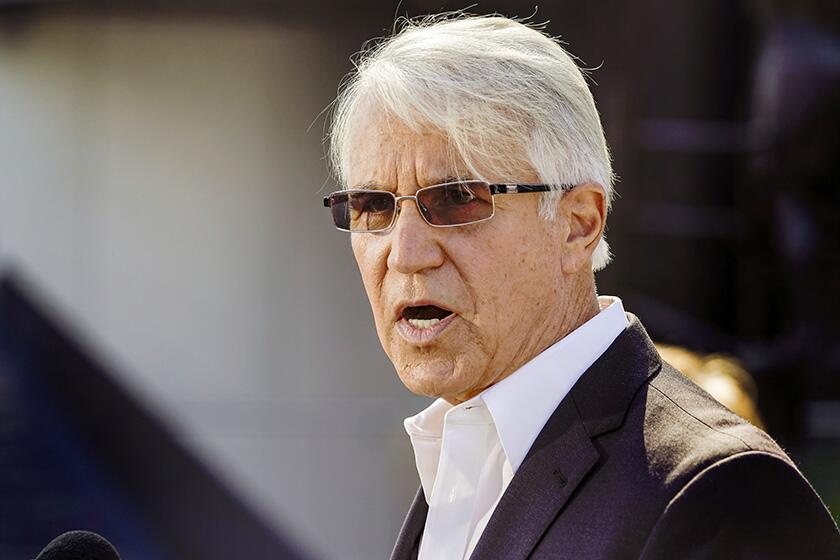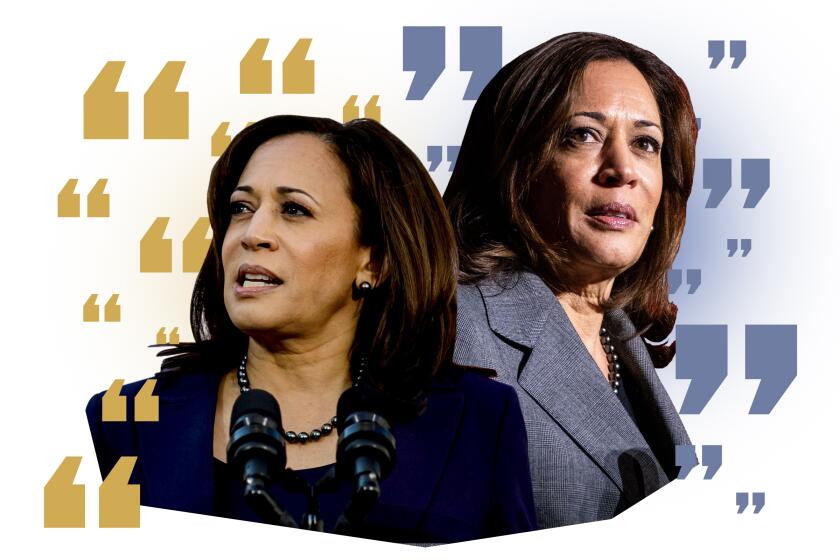Ex-Aides Tie Moriarty to Political Sex Parties : Claim That Businessman Provided Prostitutes, Name State, County and City Officials Involved
Former top aides to Anaheim fireworks manufacturer W. Patrick Moriarty say they have given criminal investigators a detailed account of how Moriarty provided prostitutes for state and local officials in an effort to gain political clout.
The former aides also have told the story in interviews with The Times, providing a growing list of governmental officials, bankers and others the one-time aides said were provided with prostitutes paid for by Moriarty.
Those named by former Moriarty associate Richard Raymond Keith, 47, include former Assemblyman Bruce Young (D-Norwalk), Assembly Democratic Leader Mike Roos of Los Angeles and Assemblyman Richard Robinson (D-Santa Ana).
Independent Inquiry Also listed by Keith and another former Moriarty aide, John E. (Pete) Murphy, 62, were two local Southern California officeholders--Los Angeles City Councilman David Cunningham and Orange County Supervisor Ralph B. Clark.
The involvement of these officials was independently checked by The Times with authoritative sources including people who say they were present on occasions when prostitutes were provided.
Responses of the politicians to these allegations vary.
Roos, 39, said “I’m just not going to respond.” Robinson, 41, called the allegations “ludicrous.” Young, 38, who was identified by The Times last September as allegedly having been provided with Moriarty-paid prostitutes, has denied the allegations.
Cunningham, 49, would only say the charges are “ridiculous.”
Clark, 67, denied ever having engaged in sex with any prostitutes. He did say he had attended several routine luncheons in Los Angeles with Keith and Orange County lobbyist Frank Michelena. At one of the lunches, he said, there were some “public relations women” and he gave them his card.
“This could be the cause of all this,” Clark said.
The 53-year-old Moriarty, through his Sacramento attorney, Donald Heller, denied any involvement with prostitutes. Heller earlier had denied all allegations by Keith, describing the former close associate of Moriarty as a person who is “trying to create a false defense for his own conduct.”
Keith has been indicted on 13 counts of bankruptcy fraud, income tax evasion and making false statements to a bank. He is tentatively scheduled for trial next month.
Charges that Moriarty used prostitutes to influence public officials and others first surfaced almost a year ago in an affidavit containing information provided by California Canadian Bank executive Jonas T. Gislason of El Toro to Orange County district attorney’s investigators.
Gislason accused Moriarty of providing prostitutes to him and other bank officials who handled millions of dollars in loans for the Anaheim businessman.
Gislason also told the investigators that he “believed” that Moriarty once provided a prostitute at the Anaheim Sheraton Hotel for former Los Angeles Fire Chief John C. Gerard, who supported a 1979 proposal to allow sale of safe-and-sane fireworks in sections of Los Angeles lying within a mile of other cities that allowed the sale of such fireworks.
Responding to Gislason’s contention, Gerard said: “To the best of my recollection, I did not have sex with anyone at the Sheraton Hotel.”
In response to the Gislason charges, Moriarty issued a statement through his attorney, saying: “It’s unfortunate this secret . . . investigation is retrogressing to a fishing expedition into the sewer.”
Last May, not long after Gislason’s disclosures, state Sen. H. L. Richardson (R-Glendora) told The Times that Moriarty asked him to help stop the criminal investigation into the fireworks manufacturer’s political activities, particularly the allegations about providing prostitutes for state legislators and other public officials.
Richardson said he immediately reported Moriarty’s overture to Orange County Dist. Atty. Cecil Hicks, who was directing the investigation.
Moriarty, Richardson said, “wanted me to intercede (with Hicks) and see if it (the political investigation) could be dropped. He asked me to look into the matter and see if I could be of some assistance. He wanted my advice. The best I could give him was, ‘Well, let me look into it. . . .’ He (Moriarty) was trying to get it all (the investigation) dropped.”
Richardson said Moriarty told him that the probe could hurt “innocent people,” particularly families of public officials.
Casual Reference The senator quoted Moriarty as saying: “ ‘Well, we had some parties and you know how some of those whores and prostitutes show up. . . .’ ” Richardson said Moriarty “made it sound like they just stumbled by, like it’s a normal occasion for them to show up at those things.”
Moriarty refused to respond to Richardson’s charges.
The most recent disclosures by Moriarty’s former associates add new momentum to the prostitution aspect of a widening inquiry being conducted jointly by the U.S. attorney’s office and the Orange County district attorney. The probe already has resulted in the indictment of Moriarty on racketeering charges in connection with licensing of a City of Commerce poker parlor.
Keith, formerly Moriarty’s closest business associate, recently told a television interviewer why using prostitutes was effective.
“It gave you the ability to not only socialize and develop a cronyism with the individual but also (it was) a mild form of extortion at certain points when the investigation became involved and focused on the girls,” Keith said in the report, aired recently by KCBS-TV in Los Angeles.
In his interviews with The Times, Keith told of arranging prostitutes for 10 public officials, eight bankers and dozens of other friends and associates. The encounters, he said, occurred in a variety of settings.
Beverly Hills Parties He and Murphy, both of whom say they also arranged paid sex for themselves, gave accounts of frequent sex “parties” in a Beverly Hills penthouse where guests also were treated to hot and cold buffets and a well-stocked bar.
“It was like a New Year’s Eve party,” Keith said. “If somebody fell in love, fine.”
Keith and Murphy also listed liaisons that took place at hotels in Anaheim, Buena Park, Fullerton, Los Angeles, Sacramento and such faraway places as New York, Washington and London.
Keith said he would pay for the prostitutes initially and then Moriarty would reimburse him. Most times, Keith said, he would cash a check and deliver the cash directly to a Los Angeles madam or he would pay some of the prostitutes directly.
He said he delivered between $300,000 and $400,000 to the women for their services. Keith estimated that since 1978 Moriarty and his associates have paid between $600,000 and $750,000 for prostitutes. Former Moriarty associate Murphy said Keith’s estimates “sounded pretty close.”
To get reimbursed, Keith said, “I would say, ‘Pat, I need money.’ I would put down on a slip of paper, I would . . . say whatever hookers were involved in that week’s activities ‘needs $2,000, $3,000, $4,000, $5,000 or $10,000’ or whatever it was. (Or) I would say, ‘I need $3,000, $4,000 or $5,000’ to cover whatever political contributions I made (for Moriarty).
“He (Moriarty) would issue a check for $5,000 or $25,000 or $50,000 to cover whatever we needed,” Keith said.
Keith said he has given investigators the names of all those he can recall providing with prostitutes. The Times has reported only the names of officials whose participation could be independently checked with authoritative sources including people who say they were present when the encounters occurred. These sources have declined to be identified.
Keith made a distinction between the politicians to whom he said prostitutes were provided.
He said Supervisor Clark and Councilman Cunningham requested prostitutes “directly as prostitutes and at all times knew they were prostitutes.” Assemblymen Young, Roos and Robinson, according to Keith, could have thought the prostitutes were “friends of Dick Keith’s” and that the Beverly Hills penthouse where they had sex “could have been Dick Keith’s apartment.”
The assemblymen, Keith said, “could have thought they were party girls or good time girls.” He added that there was never any money exchanged in front of any politicians.
Over the years, dozens of prostitutes were used, Keith said, including part-timers he described as “pro-ams.” Murphy spoke almost paternally of the professional prostitutes he called “my soiled doves.”
Moriarty began hiring prostitutes in the early 1970s as a way of entertaining businessmen, according to Murphy.
That worked so well, Murphy said, that Moriarty decided to use prostitutes in the political arena.
“It worked with other things so let’s try it with them (public officials),” Murphy explained of Moriarty’s original practice of providing prostitutes for businessmen.
“After a while, the politicians, like the businessman, felt they were entitled to this. They felt we were obligated to entertain them. After they went once, they expected it regularly,” Murphy said.
More to Read
Get the L.A. Times Politics newsletter
Deeply reported insights into legislation, politics and policy from Sacramento, Washington and beyond. In your inbox three times per week.
You may occasionally receive promotional content from the Los Angeles Times.










